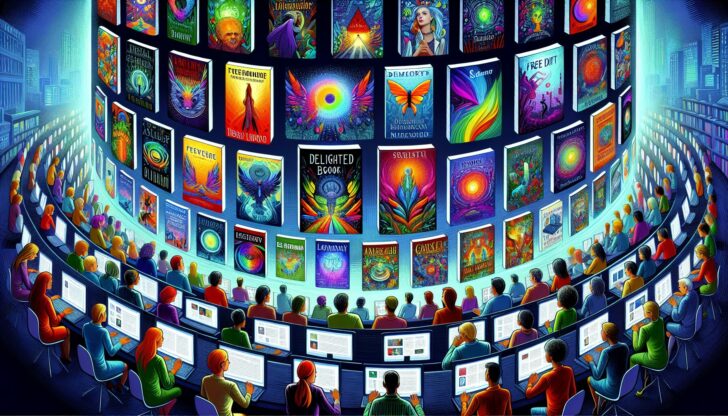Want to find the best resources for free eBooks? This article highlights where to discover free eBooks, the best devices for reading them, and practical tips to make the most of your digital library, including how to organize your eBook collection effectively.
Table of Contents
Key Takeaways
Various sources, including public libraries and Project Gutenberg, provide access to a vast collection of free eBooks, enriching the reading experience without financial burden.
Choosing the right device for reading eBooks, such as dedicated eReaders like Kindle or versatile tablets, enhances comfort and accessibility.
Understanding copyright laws and recognizing public domain works are essential for legally accessing and sharing eBooks.
Discover Free eBooks

The quest to find free eBooks can lead you to various sources, each offering a unique collection of digital books. From public libraries to dedicated websites like Project Gutenberg, there are countless places to explore and download eBooks legally. These platforms make it easier than ever to build a vast digital library without any cost, allowing you to indulge in more books than ever before.
Public libraries offer access to free eBooks with just a library card. Similarly, Project Gutenberg has an extensive collection of over 70,000 public domain books available for free download.
Beyond these, numerous other online resources and apps provide access to a wide range of free eBooks, ensuring that your reading list is always full.
Public Libraries
Public libraries have embraced the digital revolution, providing readers with access to free eBooks through platforms like OverDrive. With a valid library card, you can browse and download digital books from the comfort of your home. This service extends beyond eBooks, offering audiobooks and magazines as well.
The convenience of accessing a library’s entire catalog online makes it easier than ever to discover new titles and enjoy your favorite genres without the wait times often associated with print books.
Project Gutenberg
Project Gutenberg is a haven for those looking to find free eBooks. This platform offers over 70,000 public domain books, making it a treasure trove of classic literature and historical texts. The eBooks are available in various formats, including epub and Kindle, ensuring compatibility with most eReaders.
The vast collection includes works where U.S. copyright has expired, allowing for free access and distribution. Whether you’re looking to revisit the classics or explore new literary worlds, Project Gutenberg is a valuable resource for any avid reader.
Other Online Resources
Beyond public libraries and Project Gutenberg, there are numerous other websites and apps where you can find free eBooks. Platforms like Free-eBooks.net, ProlificWorks, and Smashwords offer a diverse selection of genres, including science fiction, fantasy, and more.
These sites often feature works by independent authors, providing readers with fresh voices and unique stories. Whether you’re browsing from your computer or using a mobile device, these resources make it easy to download and enjoy digital books legally.
Best Devices for Reading eBooks

Choosing the right device can significantly enhance your eBook reading experience. From dedicated eReaders to versatile tablets and laptops, each option offers unique features that cater to different reading preferences. eReaders like the Kindle and NOOK provide a focused reading experience with e-ink technology that mimics the feel of printed pages.
Tablets and mobile devices, on the other hand, offer additional functionalities such as apps, multimedia, and internet browsing, making them a versatile choice for readers who multitask. Readers who prefer larger screens and robust functionality may find computers and laptops to be excellent options. These devices provide a comfortable viewing experience for lengthy texts and offer features like note-taking and highlighting.
No matter your preference, there’s a device out there that can make your eBook reading more enjoyable and convenient.
Kindle vs. NOOK
When it comes to dedicated eReaders, Kindle and NOOK are two of the most popular choices. Kindle devices, particularly the Paperwhite, are known for their high-resolution screens and note-taking capabilities. The Amazon Kindle Store also offers a vast selection of eBooks, including many free titles.
NOOK eReaders, praised for their user-friendly design and long battery life, emphasize works by independent authors. Both brands also offer tablet options that combine e-reading with additional functionalities, giving readers the best of both worlds.
Tablets and Mobile Devices
Tablets and mobile devices such as the NOOK Lenovo tablet offer an immersive reading experience with vivid color displays and access to various reading apps. These devices are not limited to just eBooks; they also support multimedia content, making them a versatile choice for readers who enjoy magazines, comics, and streaming videos.
The ability to browse the internet and use various apps alongside reading makes tablets and mobile devices a powerful tool for any book lover.
Computers and Laptops
Reading eBooks on computers and laptops has its own set of advantages. The larger screens provide a comfortable viewing experience for lengthy texts, and high-resolution displays enhance the clarity of text and images. Many eBook reading apps for computers offer features like note-taking, highlighting, and easy text search, making it easier to study and conduct research.
Additionally, using laptops allows for multitasking, enabling readers to access online resources and manage their eBook collections efficiently.
Popular Genres in eBooks
eBooks cover a wide range of genres, but some of the most popular include science fiction, fantasy, and non-fiction. These genres offer rich narratives and diverse themes that captivate readers and transport them to different worlds. Whether you’re a fan of futuristic technology, magical realms, or real-world insights, there’s an eBook genre that will pique your interest.
Science fiction eBooks often delve into advanced technology and alternate realities, challenging our understanding of the universe. Fantasy eBooks, on the other hand, weave tales of magical elements and mythical creatures that ignite the imagination. Non-fiction eBooks provide valuable knowledge on various topics, from history to self-help, making them an excellent resource for lifelong learning.
Science Fiction
Science fiction eBooks are a favorite among readers who enjoy exploring futuristic concepts and imaginative narratives. Common themes include advanced technology, space exploration, and alternate realities, which push the boundaries of our understanding of the world. These books often engage readers with thought-provoking ideas and compelling stories that challenge the status quo.
Platforms like Project Gutenberg and other online resources offer a wealth of free science fiction titles for readers to enjoy.
Fantasy
Fantasy eBooks transport readers to magical worlds filled with mythical creatures, enchanted lands, and epic adventures. Popular fantasy titles often involve complex characters and richly detailed settings that captivate the imagination.
With the availability of free fantasy eBooks on platforms like Smashwords and Free-eBooks.net, readers can easily explore new realms and immerse themselves in fantastical stories without any cost.
Non-Fiction
Non-fiction eBooks cover a wide array of topics, providing readers with valuable insights and knowledge. From history and biographies to self-help and educational resources, these books offer practical information and personal development tools.
Platforms like Open Library and Project Gutenberg host numerous highly regarded non-fiction titles available for free, making it easy for readers to access a wealth of knowledge and learn new skills.
Enhancing Your eBook Experience

Enhancing your eBook reading experience involves more than just choosing the right book or device. It also includes utilizing features like bookmarking, note-taking, and screen customization to make reading more enjoyable and efficient. eReaders excel at providing a paper-like experience, while tablets offer additional functionalities such as web browsing and multimedia content. Adjusting settings like font size, background color, and lighting can significantly improve reading comfort and reduce eye strain, especially during long reading sessions.
Moreover, syncing your eBooks across multiple devices ensures a seamless reading experience. This allows you to pick up where you left off, regardless of whether you’re reading on your eReader, tablet, or computer. By leveraging these features, you can make the most out of your digital reading experience.
Bookmarking and Notes
Bookmarking and note-taking are essential features that enhance the eBook reading experience. Many eReaders and reading apps, like Google Play Books, allow users to create multiple bookmarks and highlight important sections. This functionality makes it easy to navigate through lengthy books and keep track of key points.
Additionally, note-taking features enable readers to jot down thoughts and annotations directly within the eBook, streamlining the study process and making it easier to revisit important information.
Customizing Your Reading Screen
Customizing your reading screen can significantly improve reading comfort. Here are some adjustments you can make:
Adjust the font size to your preference to make the text easier to read.
Change the background color to reduce eye strain.
Use larger screens on computers and laptops for a more comfortable viewing experience for extensive documents.
Utilize features like night mode and adjustable lighting to further enhance readability.
By tailoring these settings to your needs, you can create a more enjoyable and personalized reading environment.
Syncing Across Devices
Syncing your eBooks across multiple devices ensures that you can pick up right where you left off, no matter which device you’re using. Many eReading platforms offer cloud synchronization, keeping your reading progress and annotations updated across all your devices.
This seamless integration means you can start reading on your eReader at home, continue on your tablet during your commute, and finish on your computer at work. By utilizing these syncing features, you can enjoy a continuous and uninterrupted reading experience.
Educational Uses of eBooks
eBooks have revolutionized the educational landscape by providing students and lifelong learners with easy access to a vast array of digital books. Whether you’re a student in a classroom, a university researcher, or an adult seeking personal development, eBooks offer valuable resources that can enhance your learning experience. Public libraries, university libraries, and various online platforms host a wealth of free non-fiction eBooks that cover topics from history and science to self-help and biographies.
In addition to the convenience of accessing these resources from anywhere, eBooks also offer interactive features such as multimedia elements, quizzes, and annotations, which can make learning more engaging and effective. eBooks offer educational benefits that help learners of all ages continuously expand their knowledge and skills.
Classroom Integration
The portability of eBooks makes them an excellent tool for classroom integration. Students can carry an entire library on devices like tablets and smartphones, reducing the need for physical textbooks. Platforms like Sora provide K-12 students with access to eBooks and audiobooks, enhancing their learning experience through digital means.
The ability to highlight text, take notes, and bookmark pages directly within the eBook streamlines the study process and helps students stay organized.
University Libraries
University libraries have embraced digital resources, offering students access to a vast collection of academic eBooks. These resources support research across various disciplines, providing students with up-to-date information and scholarly works. By utilizing digital books, university libraries can offer a broader range of materials without the physical space constraints of traditional libraries.
This digital shift not only supports academic research but also makes it easier for students to access essential resources from anywhere.
Lifelong Learning
Lifelong learning is a crucial aspect of personal and professional development, and free eBooks provide an excellent resource for continuous education. Online platforms offer a wide range of eBooks that cater to various interests and skill levels, from self-help and personal development to advanced technical skills.
By creating personalized eBook collections, individuals can curate content that aligns with their learning objectives, ensuring they have access to the knowledge they need to grow and succeed.
Legal Considerations
Understanding the legal considerations surrounding eBooks is essential to ensure that you are accessing and sharing content lawfully. Copyright law protects the expression of ideas, restricting the reproduction, distribution, and display of creative works without permission. However, works in the public domain, such as those with expired copyrights or created by U.S. government employees, can be freely accessed and shared. Platforms like Project Gutenberg provide a vast collection of public domain books, allowing readers to explore classic literature and historical texts without legal concerns.
Each eBook platform has specific terms of use that outline how their content can be accessed and shared. Familiarizing yourself with these guidelines can help you avoid legal issues. Project Gutenberg allows free use of its eBooks in the U.S., but users outside the country should check local copyright laws to ensure compliance.
Copyright Law
Copyright law plays a significant role in the distribution and use of eBooks. It protects the expression of ideas but not the ideas themselves, allowing for the free use of general concepts. Project Gutenberg, for example, offers non-commercially shared audiobooks and eBooks where the copyright holder has granted permission for unlimited use.
However, readers outside the U.S. should check the copyright terms in their countries to ensure they are compliant with local laws.
Public Domain Books
Public domain books are works whose copyrights have expired or were never protected by copyright, making them free for public use. In the U.S., works published before 1924 are in the public domain and can be used without permission. Additionally, U.S. government works created by federal employees in their official capacity are also considered public domain.
This availability allows readers to access a wealth of classic literature and historical texts without legal restrictions.
Terms of Use
Each eBook platform has specific terms of use that dictate how their content can be accessed, shared, and redistributed. It’s crucial to familiarize yourself with these guidelines to avoid any legal issues.
Project Gutenberg allows free use of its eBooks in the U.S.; however, users outside the country should verify local copyright laws for compliance. Understanding these terms helps navigate the legal landscape of digital books effectively.
Learn more, visit Top 32 Websites To Download Free EBooks For Avid Readers.
Summary
In conclusion, the world of free eBooks is vast and full of opportunities for avid readers. By exploring resources like public libraries, Project Gutenberg, and various online platforms, you can find a wealth of digital books without any cost. Whether you prefer reading on eReaders, tablets, or computers, there’s a device that suits your needs. Popular genres like science fiction, fantasy, and non-fiction offer endless adventures and knowledge. By enhancing your eBook experience through bookmarking, customization, and syncing, you can make the most of your digital library. Embrace the educational benefits of eBooks and stay informed about legal considerations to enjoy a seamless reading journey. Dive into the world of free eBooks and let your literary adventures begin!
Frequently Asked Questions
How can I find free eBooks?
Free eBooks can be easily accessed through public libraries, Project Gutenberg, and websites such as Free-eBooks.net and ProlificWorks. These resources provide a wide selection of titles at no cost.
What are the best devices for reading eBooks?
The best devices for reading eBooks are eReaders such as Kindle and NOOK, as well as tablets and mobile devices, each providing distinct advantages for a comfortable reading experience.
What are some popular genres in eBooks?
Popular genres in eBooks include science fiction, fantasy, and non-fiction, which provide readers with a wide range of captivating narratives. This variety ensures that there is something for every taste.
How can I enhance my eBook reading experience?
To enhance your eBook reading experience, utilize features such as bookmarking, note-taking, screen customization, and cross-device syncing. These tools allow for a more personalized and convenient reading journey.
What legal considerations should I be aware of when using free eBooks?
It is essential to understand copyright laws, identify public domain works, and review the terms of use for various eBook platforms to ensure legal compliance when using free eBooks. Noncompliance could lead to legal issues, so staying informed is critical.








